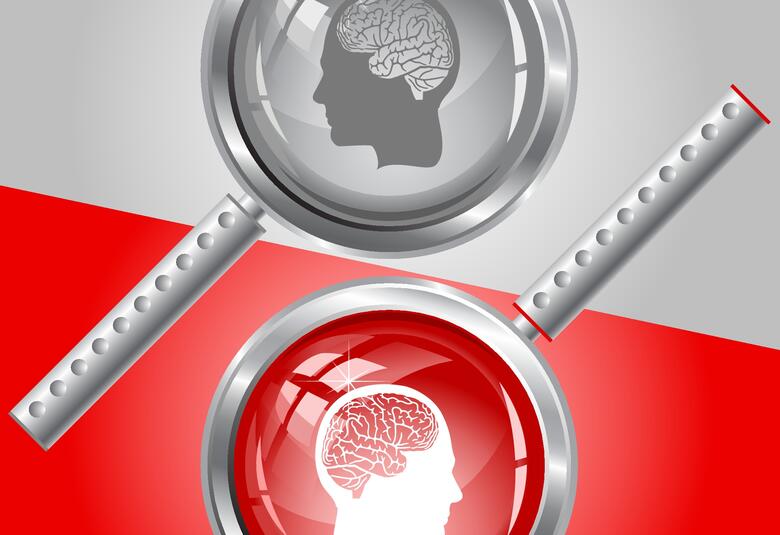The cognitive and physiological burdens of bipolar disorder, and some approaches to its treatment, were discussed by three international speakers in this symposium.
Normalizing emotional regulation to prevent neuroprogression
Prof Hilary Blumberg (Yale School of Medicine, USA) first introduced some features of the natural course of untreated bipolar disorder. This shows increasing severity and frequency of episodes of both mania and depression over time, so bipolar disorder is considered a neuroprogressive disorder. One of the major goals of treatment is therefore to reduce the frequency and severity of episodes, in order to prevent disease progression and to improve patients’ prognosis.
MRI scanning shows changes in both the size and neuronal connectivity of certain brain areas that form emotional circuitry, which are consistent with the symptomatology of bipolar disorder
MRI scanning shows changes in both the size and neuronal connectivity of certain brain areas that form emotional circuitry, which are consistent with the symptomatology of bipolar disorder. A reduction in volume of the amygdala may be present in patients by young adulthood. This develops in tandem with an increased activity and responsiveness in the amygdala. In addition, there is a reduction in volume of the ventral prefrontal cortex (VPFC) in young adults with bipolar disorder. This is an area of the frontal brain that has dense connections both with the amygdala and the hypothalamus (and thus with primitive functions such as sleep). Moreover, there is a relative loss of the white matter that provides the connection between the VPFC and amygdala, compared with the usual developmental trajectory of this pathway.
Although some of these changes appear to be established by early adulthood, because myelination in the PFC continues to develop and mature through adult years, there may also be an opportunity to intervene in these processes in adults with bipolar disorder. The Brain Emotion Circuitry-Targeted Self-Monitoring and Regulation Therapy (BE-SMART) study is looking at combined psychosocial treatments and assessing the effects using imaging. Goals of the treatment include regularizing daily rhythms, particularly sleep, and normalizing emotional regulation. Preliminary results of using this intervention are showing a dampening of the over-reactivity in the amygdala, and upregulation of the VPFC.
Top-down interventions such as psychotherapy, and bottom-up interventions such as management of daily rhythms may both have a role in managing bipolar disorder
Cognitive symptoms and their management
Cognitive impairment does not appear to be part of the neurodevelopmental syndrome of bipolar disorder. The impairments patients show in memory and executive function are not generally considered to be tightly linked to episodes of mania or depression, and are not present before disease onset. Nevertheless, some patients show accelerated cognitive decline as the disorder progresses. Prof Allan Young (King’s College London, UK) stressed that the real-world impact of cognitive decline on patients is considerable, and it presents a significant public health issue. There is therefore a clear need to assess and manage cognitive symptoms in patients.
There is a clear need to assess and manage cognitive symptoms in patients with bipolar disorder
Potential causes of cognitive decline in patients with bipolar disorder include neuroinflammation, oxidative stress, and dysregulation of the hypothalamic–pituitary axis. There is also a close association between sleep dysfunction and cognitive impairment in euthymic patients with bipolar disorder, although the direction of causation of these effects is not known.
Some medications have been investigated in an attempt to manage cognitive impairment in bipolar disorder, although only preliminary results are currently available. There are also preliminary studies of cognitive remediation in bipolar disorder. Prof Eduard Vieta (University of Barcelona, Spain) proposed that cognitive remediation alone may not provide all of the desired effects for patients with bipolar disorder – leaving them able to perform well on the tasks but not to function in real life. Rather functional remediation, which combines cognitive remediation with functional support for activities of daily living and work, may be more effective for these patients. Prof Young stated, therefore, that to manage cognitive decline in patients with bipolar disorder, clinicians may need to investigate combination treatments of pharmacotherapy and cognitive/functional remediation. It is also important to develop patient stratification, to identify patients who are at risk, and those most likely to benefit from treatments.
To manage cognitive decline in patients with bipolar disorder, clinicians may need to investigate combination treatments of pharmacotherapy and cognitive/functional remediation
The ‘unseen’ burden of bipolar disorder
Many patients with bipolar disorder are ‘theoretically well’, in that they have reached a threshold that would define a treatment response, but they are not doing well in their own terms. Prof Vieta argued, therefore that there is a need to move towards treatment outcomes that reflect the patient’s functionality and not simply symptom improvement. This includes reducing the allostatic load experienced by patients with bipolar disorder – the wear and tear on their body produced by the multiple and chronic stresses of a long-term mental illness. Factors that have a detrimental impact on patient functioning include persistent symptoms of depression and larger numbers of manic episodes a person has experienced. These increase allostatic load, which reduces patient functioning over time.
There is a need to move towards treatment outcomes that reflect the patient’s functionality and not simply symptom improvement
It is therefore important that clinicians take steps to reduce the burdens associated with this long-term disease by intervening appropriately as early as possible. Prof Vieta suggested that for individuals who are at risk (e.g. those who have a relative with bipolar disorder) and present with potential prodromal symptoms, self-help advice (e.g. on sleep and avoiding recreational drug use) could be given. Psychoeducation on self-regulation and treatment adherence are particularly important once the disease has developed. He suggested taking steps to restore good patient functioning by: treating subthreshold depression and co-morbidities, recommending physical exercise, and supporting functional outcomes by cognitive/functional remediation. He also suggested that patients build up their cognitive reserve at early stages in life, as this provides some protection against later loss of cognitive function.




